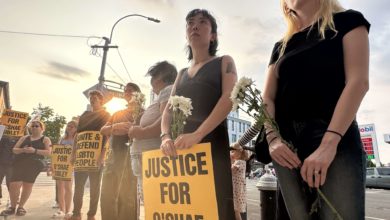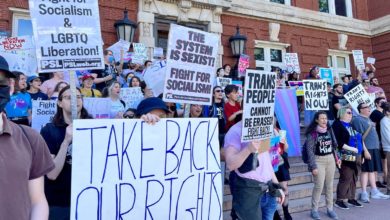Since coming to power in January, the Trump Administration, through U.S. Attorney General Jeff Sessions, has taken aim at a number of human rights provisions and sought to weaken or eliminate them.
On October 5, Sessions fired the latest salvo in a memo to all federal prosecutors stating that provisions from the 1964 Civil Right Acts that protect against sex discrimination, do “not encompass discrimination
based on gender identity per se, including transgender status.”
Sessions, in his announcement on October 5, explained further calling the determination, “A conclusion of law not policy.”
Originally, the provisions of Title VII were limited in scope. The main purpose was concerned with giving women the right to work in industries where women had been traditionally excluded. However, between 1989 and 2014, 18 federal court cases directly applied and widened the scope of the meaning of discrimination “because of sex” as used in both Title VII, which deals with workplace discrimination and Title IX which covers education, to include sexual orientation and gender identity (an emerging view in the last ten or fifteen years that is beginning to take center stage), according to attorney Peter Goselin.
The first of those was the 1989 Price Waterhouse v. Watkins decision by the U.S. Supreme Court which ruled that gender stereotyping was a violation under Title IX. Since that decision, LGBTQ advocates have used the precedent to argue that discrimination based on sexual orientation and gender identity should also be unlawful Under Title IX.
In 2014, the Department of Justice, then under President Obama, put forth guidelines saying Title VII should be read as prohibiting workplace discrimination based on sexual orientation and gender identity. The move was a massive shift backed by mounting court cases, and victories for human rights on the matter.
“Federal courts are not always required to abide by position statements such as this,” Connecticut labor and employment lawyer Peter Goselin said, “but these memos sometimes will persuade a judge. In the last several years, several federal courts of appeal have written decisions either reflecting this broader reading of Title VII or expressing the belief that such decisions are on the horizon.”
Among leaders within the transgender community, the Sessions memo is seen as yet another direct attack within a year that has already seen the overturn of executive orders protecting transgender youth in the nation’s schools, and a call to ban transgender citizens from military service.
“According to Sessions, an employer is free to hang a ‘Transgender Need Not Apply’ sign in the window,” National Center for Transgender Equality executive director Mara Keisling said in an official statement following the memo disclosure, “Fortunately, he is dead wrong on the law. We’ll see him in court.”
Goselin shares that sentiment, saying that the administration is acting with a note of wariness in some respects, because of the street heat and positive popular sentiment toward LGBTQ people by the public at large.
“The DOJ under Attorney General Sessions and President Trump trying to push back by rescinding the 2014 memo and issuing new guidelines explicitly permitting anti-trans discrimination is a commentary on how powerful the movement for the rights of transpersons – and for the right of all LGBTQ people – is.”
Talking to individuals and grassroots activists, there is a mix of fightback, worry, and resignation.
“This ruling is a baleful sign that rights of transgender and [all] LGBT individuals will be contingent upon what state they live in and no longer contingent upon their being Americans,” said Denise Wilson, a New York-based IT consultant. “It creates a precedent that the rights of a class of people can be wiped away with the whim of a bureaucrat.”
Nondiscrimination rights exist for trans people in some states, but are easy to undermine, and violations of them – like any workplace rights – are difficult to prove. In most states, however, there are no codified protections to begin with, and the Sessions memo threatens to only encourage this.
Pennsylvania activist Dee Culp, who is fighting to gain transgender rights in a state with no protections at the state level and limited statutes at the municipal and county levels, says: “My concern is that this will limit the progress of rights to the individual counties, cities and townships that don’t have them yet.”
While trans workers’ rights were never a priority in legislature to begin with, this announcement is an additional blow to an already economically devastated community. Trans people are at a much greater risk of unemployment and underemployment than the general population: the rate of unemployment is approximately twice as high for trans people. Nearly half of all trans people who are employed do not make enough to survive: transgender workers are four times more likely than cis workers to have an income of under $10,000 per year.
Dr. Heath Adam Ackley, a lead staff member at Trans Lifeline, shares those concerns and put them in harsher focus. In a broader statement about the harmful tendency of academic institutions to expect transgender professionals to participate in conversations and presentations about the trans struggle without compensation, he said: “So that now anyone with a gender complexity can be fired regardless of job performance, references, education, experience, and international influence, the expectation that we’ll provide professional services for free adds insult to the ongoing injury — that the person asking and their audience think our lives are up for debate as some kind of spectacle for their amusement.”
Liberation News also interviewed Anthony Stowers, a trans teacher in New Haven, Ct. He emphasized the importance of worker solidarity in the face of this attack. “I think it has to look like other workers explicitly demanding the rights of trans workers,” Stowers said. “It’s about realizing that the only thing that separates trans workers from cis workers is not the quality of their work, but a perceived disposability. This is about the idea that one quality of a worker’s self can make them less ‘valuable’ as a worker (and in the eyes of capitalist society, as a person) and therefore inhibit their ability to live. Cis workers are not immune to that, they’re just not the current target. Solidarity looks like the realization that every worker is vulnerable and action that stems from that realization, rooted in defense of the current target. Right now that’s trans people, so cis workers should be showing up for us, just as I’m ready to show up for them if they become targeted.”
This newest attack is unsurprising, but dangerous for both the trans community and for all workers. The only answer is to fight back together – not only against the Trump administration’s agenda, but against the entire system that creates poverty, destroys our communities and refuses to protect us. Poor and working trans people are among the most resilient people in this country, and the ongoing trans rights struggle in the streets is an example for all true revolutionaries to follow.






